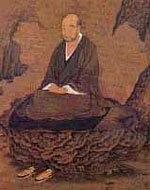Koso Wasan 24
Master T'an-luan answered: 'Since my wisdom is shallow
And I have not yet attained the higher stages of bodhisattvahood,
I am incapable, with my powers of mindfulness,
Of thinking equally on all lands.'
Knowing our Limitations

Tao-ch'o was born twenty years after T'an-luan's attainment of birth in the Pure Land but he saw T'an-luan as his dharma teacher. This is a fact worth exploring further and we shall consider it when we come to the verses on Tao-Ch'o. What is worthy of note here is that this verse, and both the preceeding and following verses, are inspired by some passgages in the Anraku Shu of Tao-ch'o. In this venerable document, Tao-ch'o records a short biography of T'an-luan. In it T'an-luan is reported to have said, 'I am by nature an ordinary man, and my wisdom is shallow.'
When we probe the circumstances and biography of T'an-luan he begins to emerge as a most unusual and remarkable person. Just think of this claim of his. T'an-luan lived in a remarkable lacuna in Chinese Buddhist history. It was a time of real progress in the dissemination of the dharma within Chinese society and contrasted with recurring episodes of hostility. One such period of hostility to the dharma occurred just before T'an-luan's birth and another occurred not long after his death; indeed, Tao-ch'o, his successor, lived in an unfriendly time.
During this time of growth in the understanding of the dharma in Chinese society, T'an-luan appears to have been a significant player. The very fact that emperors visited him testifies to the high regard that they had for him. Nevertheless, in the episode alluded to in this verse, the emperor was actually rather disparaging about T'an-luan's exclusive devotion to Amida Buddha's 'western' Pure Land - implying that T'an-luan's single-mindedness was tantamount to heresy.
Usually, one would expect a person of T'an-luan's standing to defend himself from such criticism but instead we discover that T'an-luan is more enamoured of what he perceives to be the truth - rather than fame, esteem and reputation. In this event, I think we see the seeds of an idea which Shinran Shonin found quite liberating; giving him 'permission', as it were, to be open - like T'an-luan - in his personal assessment of his own abilities.
It is immensely encouraging to come face to face with T'an-luan's self-assessment and it gives us insight into several things. The first is that he saw the Pure Land way as his only option, for personal reasons. Then this realisation, in turn, could mature and blossom for the benefit of others. This seems to me to be very much in keeping with the way of the dharma, whereby our first concern is with our own attainment, in the understanding that this will flow through to the benefit of others; rather in the way that a flower's function is entirely for the benefit of the plant that bears it, yet it brings pleasure, refreshment and inspiration to those who see it and enjoy its scent.
A second point that we can take from this is that it brings with it an understanding of the way in which T'an-luan came to see that the 'enlightenment mind' (Sk. bodhi-citta), which arises as we set out on the bodhisattva path, may also arise in the heart of an ordinary, unenlightened person. T'an-luan is saying here that he has not yet entered the stream; that he is still a prthagjana - an ordinary person, a bombu.
Thirdly, we encounter the power of personal honesty.
Self-awareness is an especially difficult thing but I believe that if we are to live the good life, there is probably nothing more important than this - as a starting point. Our first stumbling-block is that we are disinclined to be self-critical, perferring instead, to seek out the faults of others. Rennyo Shonin suggested that our own self-assessment tends to be favorable. Rather, he suggests, we should listen to the criticism of others, and take them to heart.
We need to be cautious about these things, of course. Adverse criticism can also be wrong. We all have an animal instinct which urges us to attack someone who seems to be vulnerable, and openness and personal honesty may be interpreted as weakness. On the other hand, we can be sure that people are very unlikely to 'say what they think' about us in our presence, especially when they think it might hurt us. It depends on the level of trust that exists in our relationships. I do not think that the criticism of others is a good basis for self-awareness.
Rather, we do best to open ourselves to the light of Amida Buddha in the way of nembutsu. As we encounter challenges and difficulties in life, and if we are secure in our relationship with Amida, we will find inner resources that will free us to face our own 'demons' and such self-doubt as may afflict us.
We can keep in mind that fact that T'an-luan said, 'I am by nature...'. In the Confucian environment of his world this would refer to the 'mandate of heaven'. We are inherently limited: it is one of the things that makes us human. Not to be as personally honest as we can is self-defeating and we can't develop either as social beings or spiritually unless we know the reality of our own frailty and weakness.